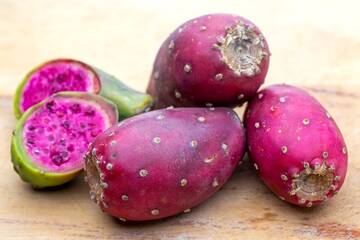Cactus fruit, with its vibrant hues and exotic appearance, has been capturing the curiosity and taste buds of adventurous food enthusiasts for generations. Commonly known as "prickly pear," this succulent fruit offers a unique blend of flavor and nutritional benefits. In this comprehensive guide, we delve into the intricacies of consuming cactus fruit, exploring its advantages, disadvantages, and the culinary techniques involved in unlocking its delicious potential.

Unveiling the Name: Prickly Pear
Before delving into the intricacies of consumption, it is essential to acquaint ourselves with the name of this intriguing fruit. Cactus fruit is often referred to as "prickly pear," owing to the prickly nature of the plant from which it originates. The term "prickly pear" encompasses various species within the Opuntia genus, each offering its distinct flavor profile and nutritional composition.
How to Eat Cactus Fruit
Embarking on the journey of consuming cactus fruit involves navigating through its spiny exterior to unveil the succulent flesh within. Here's a step-by-step guide on how to eat
cactus fruit:
Selecting Ripe Fruit: Opt for cactus fruit that exhibits vibrant colors and yields slightly to pressure when gently squeezed. Avoid fruits with soft spots or signs of mold.
Preparing the Fruit: Using tongs or gloves to protect your hands, carefully remove the spines from the cactus fruit's exterior. Rinse the fruit under cold water to eliminate any remaining debris.
Peeling and Slicing: Using a sharp knife, slice off both ends of the fruit. Make a lengthwise incision along the skin, then gently peel it away to reveal the flesh inside. Slice the fruit into desired shapes or simply scoop out the flesh with a spoon.
The Benefits of Cactus Fruit
Cactus fruit stands as a testament to nature's bounty, offering an array of health benefits to those who indulge in its consumption. Rich in vitamins, minerals, and antioxidants, this fruit serves as a potent ally in promoting overall well-being. Among the notable benefits of cactus fruit are:
High Nutritional Value: Cactus fruit boasts a rich nutritional profile, containing vitamins C, A, and K, as well as essential minerals like magnesium, potassium, and calcium.
Antioxidant Properties: The presence of antioxidants in cactus fruit helps combat oxidative stress and reduce the risk of chronic diseases such as cardiovascular ailments and cancer.
Dietary Fiber: With a high fiber content, cactus fruit aids in digestive health, promoting regularity and alleviating constipation.
The Disadvantages of Cactus Fruit
While cactus fruit offers an array of nutritional benefits and culinary delights, it is essential to be mindful of potential drawbacks associated with its consumption. Among the disadvantages of cactus fruit are:
Presence of Seeds: Cactus fruit contains numerous small seeds embedded within its flesh, which may pose a choking hazard or detract from the overall eating experience for some individuals.
Potential Allergenic Reactions: Certain individuals may experience allergic reactions to components present in cactus fruit, leading to symptoms such as itching, swelling, or gastrointestinal discomfort.
Is the Core of the Cactus Fruit Edible?
One common query among those venturing into the realm of cactus fruit consumption is whether the core of the fruit is edible. Contrary to some misconceptionایا هسته میوه کاکتوس خوردنی استthe core of the cactus fruit is indeed edible, albeit with a slightly firmer texture compared to the surrounding flesh. While some may prefer to discard the core, others appreciate its crunchy consistency as a unique
addition to salads or salsas.
How to prepare cactus fruit syrup:
Ingredients Needed
• Freshly extracted cactus fruit juice
• Granulated sugar
• Lemon juice (optional, for acidity)
• Cooking Method
In a large saucepan, combine the cactus fruit juice with an equal amount of granulated sugar, or adjust to taste depending on the sweetness of the fruits. Adding a splash of lemon juice can help enhance the natural tartness of the cactus fruits and balance the sweetness.
Simmering and Reduction
Place the saucepan over medium heat and bring the mixture to a gentle simmer, stirring occasionally to dissolve the sugar completely. Allow the syrup to simmer for 20-30 minutes, or until it reaches the desired consistency. Keep in mind that the syrup will thicken further as it cools, so it's advisable not to overcook it.
Straining and Bottling
Removing Impurities
Once the syrup has reached the desired consistency, remove it from the heat and let it cool slightly. Pass the syrup through a fine-mesh sieve or cheesecloth to remove any impurities or solid particles, resulting in a smooth and velvety texture.
Bottling and Storage
Pour the strained syrup into sterilized glass bottles or jars, leaving some headspace to allow for expansion. Seal the bottles tightly and store them in the refrigerator for up to several weeks. For longer-term storage, consider freezing the syrup in ice cube trays and transferring the frozen cubes to a freezer-safe container.
Creative Applications
Cocktails and Beverages
Cactus fruit syrup adds a delightful burst of color and flavor to cocktails, mocktails, and other beverages. Mix it with sparkling water for a refreshing spritzer, or incorporate it into margaritas, daiquiris, and fruity sangrias for a tropical twist.
Desserts and Baked Goods
Drizzle cactus fruit syrup over pancakes, waffles, or French toast for a fruity breakfast treat, or use it as a topping for ice cream, yogurt, or cheesecake. Incorporate the syrup into cake batters, muffin mixtures, or fruit compotes to infuse your baked goods with a hint of cactus fruit flavor.
Sauces and Marinades
Experiment with incorporating cactus fruit syrup into savory dishes by using it as a glaze for grilled meats, seafood, or vegetables. Combine it with vinegar, soy sauce, or chili peppers to create a tangy marinade or dipping sauce with a unique twist.
Отредактировано Esmeralda (2024-02-16 14:07:42)